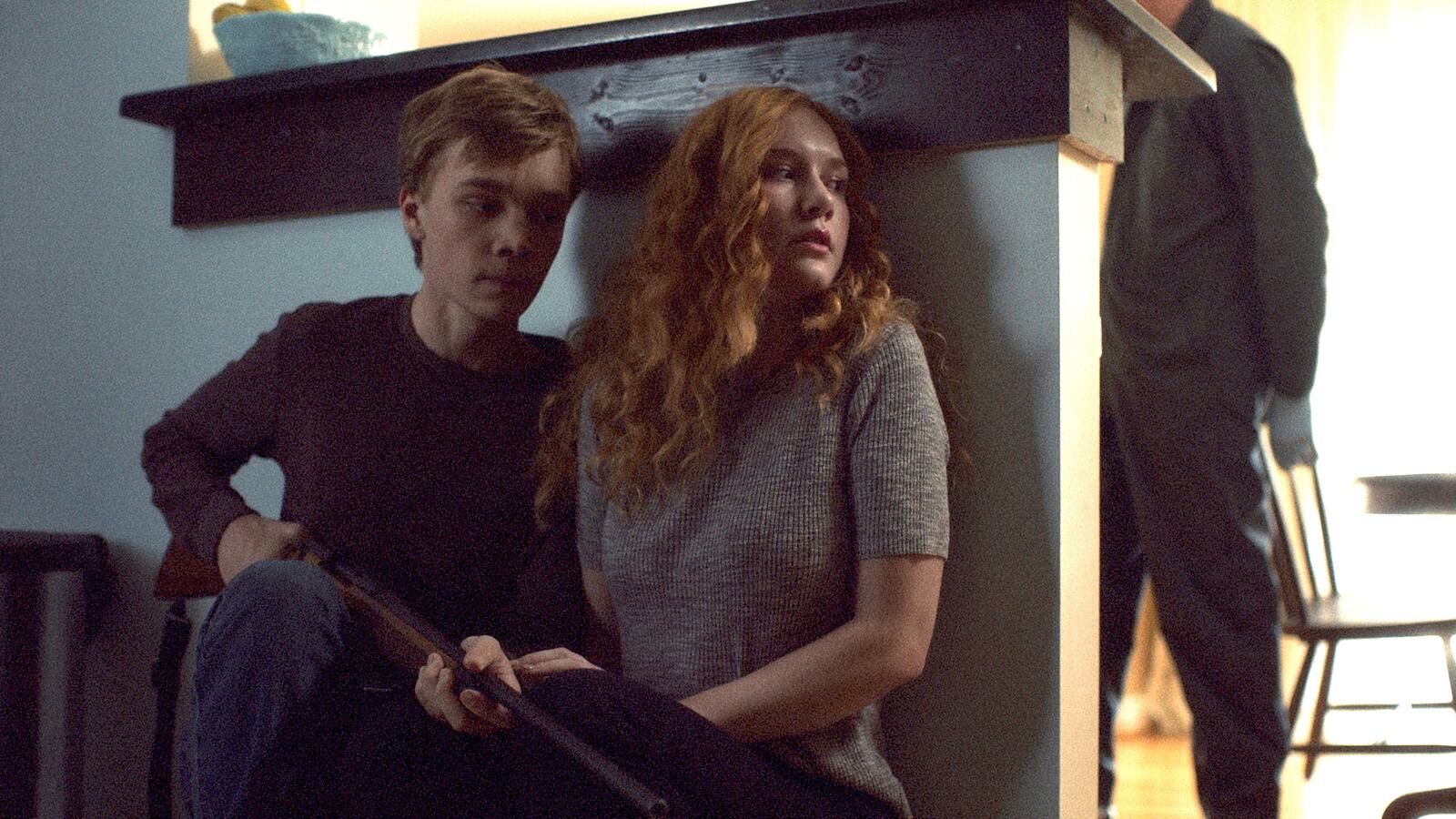Horror cinema has a long, rich tradition of deviant dads committing heinous atrocities—think Rosemary’s Baby, The Amityville Horror, The Shining, The Stepfather or Frailty, to name a few. Debuting in theaters on November 16, The Clovehitch Killer ably carries on that legacy. Yet far from a mere rehash of Father Knows (Murder) Best, Duncan Skiles’ feature brings something unique to the table: a strong dose of suspenseful mystery, as well as an even more potent strain of social critique; because in this thriller, the cheery façade concealing homicidal mania is of a distinctly religious red-state variety.
In an unnamed Anywhere, USA suburb, high-schooler Tyler (Charlie Plummer) spends his free time partaking in the Boy Scouts activities run by his group leader pop Donald (Dylan McDermott), a friendly guy with a dorky goatee, a slight paunch, and a way about him (all clichéd dad-isms and jokes) that says he really wishes he had grown up in the 1950s. Tyler also regularly attends church with his family, which includes mom Cindy (Samantha Mathis) and younger sister Susie (Brenna Sherman), whose pre-mealtime prayers are further confirmation of their Christian piety.
It’s a quiet, average life, except for the fact that each year, the town holds a memorial for the numerous girls killed by The Clovehitch Killer, a serial murderer who bound his victims with rope and left tied knots at his crime scenes as his police-taunting signature (hence his moniker). While Clovehitch reportedly ceased his lethal activities years ago, his reign of terror hovers over everyone and everything in this enclave. To Tyler, however, that’s merely a background concern—the sort of terrible thing that must be respected, but hardly impacts his day-to-day existence.
Until, that is, Tyler sneaks out one night in his dad’s truck to meet Amy (Jones Emma), who’s interested in some clandestine parking-lot fooling around. When she reaches for the handle to recline her seat, she finds a crumpled porno mag photo. As a church choir goody-two-shoes, Amy is aghast at this image and what it says about Tyler, who had claimed the truck was his own. By the next day, word about the picture has spread throughout their peer group (including Tyler’s unbearably righteous friend Billy), and Tyler has been labeled a “perv.” Yet even more worrisome than that unwanted reputation is the photo itself, which Tyler immediately realizes must belong to his dad. In response, he breaks into Don’s private shed, where he notices a loose floorboard. Inside, he locates a shoebox filled with BDSM magazines, as well as a Polaroid of a bound-and-gagged woman with the handwritten label: “Nora – Lucky’s Favorite.”
Unsurprisingly, this sets off alarm bells in Tyler’s head about his dad’s potential secret identity, and it’ll do likewise for viewers. Knowing that’s the case, The Clovehitch Killer consequently sets about raising enough doubt to prevent anyone from making definitive conclusions, lest misdirection be on the horizon. Newly suspicious, Tyler befriends Kassi (Madisen Beaty), an outcast who’s slandered by locals as a slut, and who spends her days reading newspapers behind a building adjacent to Tyler’s church. As it turns out, Kassi is obsessed with Clovehitch, and thus proves a natural partner for Tyler’s ensuing sleuthing. Their inquiry turns up more clues pointing directly to Don. But there’s a problem here that adds to the material’s ambiguity: Tyler doesn’t really want his dad to be a serial killer, and his eagerness to believe any alternate theory means that the film keeps the true nature of events somewhat hazy.
Don’s do-gooder demeanor immediately make him come across as shady—the way he gives Tyler a sex talk, replete with “I was once 16 too” comments and awkward phrases (calling carnal impulses “ just monkey stuff”), resounds as too corny for its own good. It’s easy to imagine sinister thoughts and urges lurking beneath his Ned Flanders-esque exterior, and his religiosity (and inferred conservatism) is, fundamentally, part of that equation. The Clovehitch Killer contends that Don’s godliness is a primary reason he couldn’t possibly be the fiend in question; at the same time, though, it implies the opposite: Don’s unblemished piety (and upright Boy Scout youth-leader position) is precisely why he’s such an ideal suspect, because such holy Leave it to Beaver perfection reeks of phoniness.
[Spoilers ahead]
Working from Christopher Ford’s sharp script, Skiles never uses his conceit to bludgeon viewers with a sermonizing critique of Christianity; his depiction of sick religious hypocrisy does all the heavy lifting for him. The Clovehitch Killer lays bare the untrustworthiness of too-good-to-be-true devout family men. In doing so, it suggests that faith is a useless barrier between such individuals and their basest desires, as well as a useful mask for sociopaths—a well-constructed means of selling comforting lies to family, friends and neighbors. It allows wolves to move among us freely, cloaked in sheep’s clothing.
An excellent McDermott embodies Don with just enough strangeness to keep audiences from knowing precisely where The Clovehitch Killer is heading. And he’s complemented by Plummer, whose sorrowful countenance speaks volumes about his profound crisis of confidence in his beloved father, the institutions (and assumptions) upon which his entire life has been built, and himself. The film asks, what comes first: loyalty to one’s kin, or morality? And even if one chooses the latter over the former, how does one attain true justice—and what form does it take, when exposing the truth will invariably affect so many innocent people?






